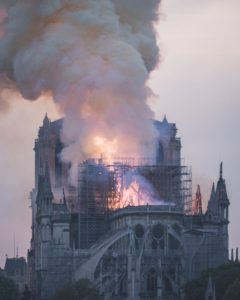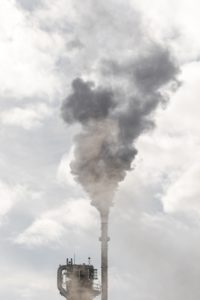Our planetary cathedral on fire
Shocked and helpless, I watched the live-stream as Notre Dame Cathedral went up in flames. Fire spread across the roof and the church’s mighty spire toppled and fell. Crowds gathered in Paris that spring night to weep and pray, to sing hymns and bear witness. Meanwhile, hundreds of fire fighters struggled to extinguish the fire, and another hundred removed artwork and sacred relics. I felt as if I were holding my breath with millions of others around the world as we waited to learn the fate of what some people consider a spiritual and cultural treasure.

Firefighters risking everything eventually brought the flames under control, and, some twelve hours after it began, the fire was snuffed out. We awoke the next morning to study the ruins and to give thanks for what was still standing: bell towers, pipe organs, and rose windows.
Rebuilding began.
But Notre Dame is not the world’s only holy place: every culture has equally precious places that mediate the transcendent. Every mosque and temple is sacred, every shrine and synagogue, and every storefront church.
And so, too, are the lands and waters of indigenous peoples sacred. Where is the protest and grief as these lands are destroyed?
The fire in Notre Dame – literally, “Our Lady” – is over. But the fire on Mother Earth rages on.
The cathedral of life is being torched before our eyes. Year by year, temperatures worldwide continue to rise, setting new records for heat. Ice caps are melting; glaciers are thinning; even the deep oceans are warming. We who are middle-aged were born into a planetary cathedral blessed with a glorious profusion of alpine meadows and coral reefs, ice shelves and wetlands, soaring forests and expansive estuaries – a beautiful, complex, fragile, and resilient sanctuary that allowed life to flourish. But that living architecture is being rapidly dismantled as the climate crisis heats up. More than half the world’s population of animals has vanished since 1970, in part because of climate change.
The web of life is going up in smoke, as the climate grows increasingly inhospitable to all life, including humans. And the people who are least responsible for climate change – low-income communities, indigenous communities, people of color, and the historically marginalized – are suffering first and hardest.
Climate arson
The Intergovernmental Panel on Climate Change (IPCC) warns that we have only a small window of time – perhaps twelve years – in which to transform our economies and make a decisive change of course away from fossil fuels and toward clean, renewable sources of energy.
Otherwise, the Earth could scorch and the cathedral of life could collapse. But already, around the world, the effects of climate change are disastrous: rising seas, massive droughts, extreme weather events, the spread of vector-borne diseases, and millions of climate migrants forced to leave their homelands.
As of this writing, the cause of the fire in Notre Dame is still unknown. By contrast, the cause of our planetary fire is well understood. For more than 30 years scientists have been sounding the alarm about the dangerous effects of burning coal, gas, and oil.

And Exxon has known this for even longer – since the 1960’s. Did it change its business model? No. Did it chart a new course and invest in clean, renewable energy? No. Instead, Exxon and other Big Polluters funded climate deniers and think-tanks that deny climate science; blocked protections that would promote clean, safe, renewable energy; confused the public by spreading misinformation; and poured billions of dollars into the effort to persuade us that fossil fuels are the answer to our energy needs.
It was a global effort to block policy – national and international – that would address the climate crisis. In fact, according to a startling new report, lobby groups representing some of the world’s biggest fossil fuel corporations have been crowding UN climate talks for decades and using the negotiations to push their agenda.
Despite Big Polluters’ extensive campaign of climate disinformation, people in the U.S. are finally beginning to see through the lies. As a result, the fossil fuel industry is taking a new tack: greenwashing. Eager to be perceived as environmentally friendly and as contributing to the common good, Exxon and other fossil fuel corporations present themselves as “energy” companies that are as devoted to providing power from sunshine and wind as they are to burning fossil fuels. (For a while, BP even tried to persuade the public that its brand was “Beyond Petroleum.”)
In actuality, developing power from sun and wind is only a miniscule part of coal and oil and gas reserves of the fossil-fuel companies, and the countries that act like fossil-fuel companies. They already hold perhaps five times the amount of coal, gas, and oil that, if burned, would further fuel the already raging climate chaos. And they continue to explore aggressively for more oil and gas. They have every intention of burning it.
If fossil fuel corporations are successful in carrying out their business plans, which require unlimited expansion of markets and ever-increasing extraction and burning of fossil fuels, they will destroy life as it has evolved on this planet, including humans.
Determined to douse the fire
I watched helplessly as Notre Dame Cathedral caught fire, but we don’t have to be helpless spectators of climate change. We don’t have to settle for standing wretchedly on the sidelines, wringing our hands. Instead, we can take responsibility for protecting our earthly cathedral, both as individuals and as members of society.
As individuals, we can learn to live more gently and lovingly in the cathedral of life. We can do everything possible to cut back sharply on our use of fossil fuels and to make wiser choices around energy.
As members of society, we can make an even greater difference. The climate emergency requires more than incremental or individual solutions: it requires bold, decisive action and systemic change. The time has come to rein in the corporate and political powers that are making huge profits by treating people and planet alike as disposable. Unless we stop them, they will extract and burn every last ounce of coal and every last drop of oil and gas until the Earth is laid waste.

That’s where the crucial work of the non-profit organization Corporate Accountability comes in: it campaigns to hold Big Polluters accountable for knowingly fueling and denying climate change. Along with a majority of the American public, Corporate Accountability understands that the fossil fuel industry bears a burden of responsibility for the harm caused by global warming and should pay for the damages.
Uplifted by a vision of a more just and life-giving society in which all people can thrive, Corporate Accountability is organizing to stop Big Polluters from writing the rules and is holding them accountable for the crisis they have fueled.
It’s time to become as focused as a fire fighter and to figure out not only how to douse the flames but also how to stop the band of arsonists that continues to fuel the fire.
Let’s say you know an arsonist – someone who is lighting and pouring gasoline on countless fires, but denying any responsibility for the havoc they cause. And let’s say you are a firefighter who is struggling to extinguish one of those fires. What if that arsonist dressed himself up like a firefighter, approached you, and earnestly claimed to be “part of the solution”? Would you let him anywhere near the building you were trying to save? Of course not! You’d probably grab his arm, hold him back, and cry out for someone to take him to court.
That’s exactly what Corporate Accountability is doing: organizing to move attorneys general around the country to investigate Exxon for its decades of climate deception. An arsonist posing as a firefighter is still an arsonist and needs to be restrained. What’s more, an arsonist who has raked in billions of dollars from setting a cathedral alight must be required to pay for the damage.
The climate crisis threatens everything we love. With that great love pouring into our hearts – our love for our children, our love for birdsong and whale-song, our love for clean air and clean water and for all the conditions that allow life to flourish on this planet – it’s an honor to stand with Corporate Accountability. I hope that you will join me in supporting their mission to confront the fossil fuel industry and hold it accountable. We intend to do everything in our power to save the living cathedral that God entrusted to our care.
##
This essay is also posted at Corporate Accountability’s Website here.

22 Responses to “Our planetary cathedral on fire ”
Edith Adams Allison
Thank you.
mbj
Thank YOU, Edith, for your partnership and leadership in climate action. We’re in this together.
Ranjit Mathews
Thank you, Margaret, for this much needed essay. We are in dire need of action and holding corporations accountable for their deeds.
mbj
I agree, Ranjit. We do need to hold corporations accountable — they are responsible for the lies they’ve spread and they need to pay for the damage they’ve caused. One thing we can all do: contact our state’s Attorney General and ask him/her to look into Exxon’s climate deception (following the lead of Attorney General Maura Healey in Massachusetts).
Dan Breslaw
Margaret, there are, and have been, many compelling summaries of the planetary crisis we face. This is one of the best. Thank you so much! Dan
mbj
Thanks so much, Dan, for being with me in the struggle to save life as it has evolved on Earth. We love our planetary home — so let’s risk everything (like the firefighters at Notre Dame) and create a society and an economy that protect what we love.
Judy Hyde
This is too good to keep it to myself. I’m passing it along widely.
mbj
Thank you, friend! I am so excited about Corporate Accountability — they have a big vision, a clear strategy, and a record of success. Thank you, Judy, for spreading the word!
Dave Roitman
Thank you, Margaret, for letting us all know about Corporate Accountability’s work.
mbj
I’m so glad to spread the word about a group that deserves our strong support. Thanks for commenting, Dave.
Alisa Pearson
Dear Margaret,
Thank you for this image. We urgently need such leadership. Standing in this blaze, we cannot stop to parse the data. You have given us a bucket to douse the flames. All buckets are needed- we mustn’t hesitate trying to choose the best one. Just lift, pour and call for backup. May you words spread like wildfire to cool this home of ours.
mbj
Thank you, my fire-fighting friend!
vivienne simon
I whole-heartedly agree. I am so grateful for the work Corporate Accountability is doing. And I love the term “climate arson.” We are indeed talking about arsonists!
mbj
Thanks for your comment, Vivienne. As I write this, 2/3 of the U.S. is baking under a heat wave. We have work to do.
Anne Lombard
July 19, 2019
Thank you for the images which will keep your message front and center.
mbj
Yes, images and stories sometimes convey meaning more powerfully than facts can, by themselves. I am a big supporter of FACTS, but also of images and stories that convey them! Thanks for your note, Anne.
Alice Speers
I think we need to tackle it where the demand for fuel is. It’s all of us, driving and flying about as if there are no consequences. We need to dry up the desire for travel, shorten up supply lines, and cut the Pentagon’s fuel budget.
mbj
I like your approach, Alice. Climate change needs to be addressed in terms of both supply AND demand. Let’s cut back on demand (reduce our carbon footprint, put a stiff price on carbon, etc.) and let’s cut back the supply (stop building new gas pipelines, quit drilling, etc.). By changing our personal patterns of consumption and by engaging in political advocacy, we can affect both supply and demand.
Tessa Sage Flores
Dear Margaret, how can I share this brilliant and powerful essay on Facebook?
Thank you,
Tessa
mbj
Thank you, Tessa, for spreading this essay around. You can share it on Facebook by posting the link as a status update (https://revivingcreation.org/our-planetary-cathedral-on-fire/) or by sharing my own Facebook post of the article. Thank you!
Juliana Collins Anderson
France has been well informed about the value of trees. It is unthinkable that knowingly French officials would allow the cutting of ancient trees for any purpose. I hope the wider community can convince them to find another source of good, younger wood
mbj
Amen! Or perhaps they would consider some kind of composite material for rebuilding the steeple — something long-lasting, durable, and sustainable. It seems astonishingly short-sighted (and self/human-centered) to think that felling ancient oak trees for this purpose is a good idea.